- Home
- Ernest Hemingway
Across the River and Into the Trees Page 16
Across the River and Into the Trees Read online
Page 16
They were not Othello and Desdemona, thank God, although it was the same town and the girl was certainly better looking than the Shakespearean character, and the Colonel had fought as many, or more times than the garrulous Moor.
They are excellent soldiers, he thought. The damned Moors. But how many of them have we killed in my time? I think we killed more than a generation if you count the final Moroccan campaign against Abdel Krim. And each one you have to kill separately. Nobody ever killed them in mass, as we killed Krauts before they discovered Einheit.
�Daughter,� he said. �Do you want me to really tell you, so you will know, if I am not rough telling it?�
�I would rather have you tell me than anything. Then we can share it.�
�It cuts pretty thin for sharing,� the Colonel said. �It�s all yours, Daughter. And it�s only the high-lights. You wouldn�t understand the campaigns in detail, and few others would. Rommel might. But they always had him under wraps in France and, besides, we had destroyed his communications. The two tactical air-forces had; ours and the RAF. But I wish I could talk over certain things with him. I�d like to talk with him and with Ernst Udet.�
�Just tell me what you wish and take this glass of Valpolicella and stop if it makes you feel badly. Or don�t tell it at all.�
�I was a spare-parts Colonel at the start,� the Colonel explained carefully. �They are hang-around Colonels, which are given to a Division Commander to replace one that he may have killed, or that are relieved. Almost none are killed; but many are relieved. All the good ones are promoted. Fairly fast when the thing starts to move sort of like a forest fire.�
�Go on, please. Should you take your medicine?�
�The hell with my medicine,� the Colonel said. �And the hell with SHAEF.�
�You explained that to me,� the girl said.
�I wish the hell you were a soldier with your straight true brain and your beauty memory.�
�I would wish to be a soldier if I could fight under you.�
�Never fight under me,� the Colonel said. �I�m cagey. But I�m not lucky. Napoleon wanted them lucky and he was right.�
�We�ve had some luck.�
�Yes,� the Colonel said. �Good and bad.�
�But it was all luck.�
�Sure,� the Colonel said. �But you can�t fight on luck. It is just something that you need. The people who fought on luck are all gloriously dead like Napoleon�s horse cavalry.�
�Why do you hate cavalry? Almost all the good boys I know were in the three good regiments of cavalry, or in the navy.�
�I don�t hate anything, Daughter,� the Colonel said, and drank a little of the light, dry, red wine which was as friendly as the house of your brother, if you and your brother are good friends. �I only have a point of view, arrived at after careful consideration, and an estimate of their capabilities.�
�Are they not really good?�
�They are worthless,� the Colonel said. Then, remembering to be kind, added, �In our time.�
�Every day is a disillusion.�
�No. Every day is a new and fine illusion. But you can cut out everything phony about the illusion as though you would cut it with a straight-edge razor.�
�Please never cut me.�
�You�re not cut-able.�
�Would you kiss me and hold me tight, and we both look at the Grand Canal where the light is lovely now, and you tell me more?�
When they were looking out at the Grand Canal where the light was, indeed, lovely, the Colonel went on, �I got a regiment because the Commanding General relieved a boy that I had known since he was eighteen years old. He was not a boy any more, of course. It was too much regiment for him and it was all the regiment I ever could have hoped for in this life until I lost it.� He added, �Under orders, of course.�
�How do you lose a regiment?�
�When you are working around to get up on the high ground and all you would have to do is send in a flag, and they would talk it over and come out if you were right. The professionals are very intelligent and these Krauts were all professionals; not the fanatics. The phone rings and somebody calls from Corps who has his orders from Army or maybe Army Group or maybe even SHAEF, because they read the name of the town in a newspaper, possibly sent in from Spa, by a correspondent, and the order is to take it by assault. It�s important because it got into the newspapers. You have to take it.
�So you leave one company dead along a draw. You lose one company complete and you destroy three others. The tanks get smacked even as fast as they could move and they could move fast both ways.
�They hit them one, two, three, four, five.
�Three men usually get out of the five (that are inside) and they run like broken-field runners that have been shaken loose in a play when you are Minnesota and the others are Beloit, Wisconsin.
�Do I bore you?�
�No. I do not understand the local allusions. But you can explain them when you care to. Please keep on telling me.�
�You get into the town, and some handsome jerk puts an air mission on you. This mission might have been ordered and never cancelled. Let�s give everyone the benefit of the doubt. I�m just telling you about things in a general way. It is better not to be specific and a civilian wouldn�t understand it. Not even you.
�This air mission does not help much, Daughter. Because maybe you cannot stay in the town because you have got too few people in, and by now, you are digging them out of rubble; or leaving them in rubble. There are two schools of thought on that. So they say to take it by assault. They repeat this.
�This has been rigidly confirmed by some politician in uniform who has never killed in his life, except with his mouth over the telephone, or on paper, nor ever has been hit. Figure him as our next President if you want him. Figure him any way you like. But figure him and his people, the whole great business establishment, so far back that the best way to communicate with them rapidly would be by racing carrier pigeons. Except, with the amount of security they maintained for their proper persons, they would probably have their anti-aircraft shoot the pigeons down. If they could hit them.
�So you do it again. Then I will tell you what it looks like.�
The Colonel looked up at the play of the light on the ceiling. It was reflected, in part, from the Canal. It made strange but steady movements, changing, as the current of a trout stream changes, but remaining, still changing as the sun moved.
Then he looked at his great beauty, with her strange, dark, grown-up child�s face that broke his heart, that he would be leaving before 1335 (that was sure) and he said, �Let�s not talk about the war, Daughter.�
�Please,� she said. �Please. Then I will have it all this week.�
�That�s a short sentence. I mean using the word sentence as a jail sentence.�
�You don�t know how long a week can be when you are nineteen.�
�Several times I have known how long an hour can be,� the Colonel said. �I could tell you how long two minutes and a half can be.�
�Please tell me.�
�Well I had two days� leave in Paris between the Schnee-Eifel fight and this one, and due to my friendship with one or two people I was privileged to be present at some sort of a meeting, where only the accredited and trusted were present, and General Walter Bedell Smith explained to all of us how easy the operation that later took the name of Hurtgen Forest would be. It was not really Hurtgen Forest. That was only a small sector. It was the Stadtswald and it was where the German High Command had figured, exactly, to fight after Aachen had been taken and the road into Germany breached. I hope I am not boring you.�
�You never bore me. Nothing about fighting bores me except lies.�
�You�re a strange girl.�
�Yes,� she said. �I�ve known that for quite a long time.�
�Would you really like to fight?�
�I don�t know if I could do it. But I could try if you taught me.�
�I�ll never teach you. I�ll just te
ll you anecdotes.�
�Sad stories of the death of kings.�
�No. GI�s somebody christened them. God how I hate that word and how it was used. Comic book readers. All from some certain place. Most of them there unwillingly. Not all. But they all read a paper called �The Stars and Stripes� and you had to get your unit into it, or you were unsuccessful as a commander. I was mostly unsuccessful. I tried to like the correspondents and there were some very good ones present at this meeting. I will not name names because I might omit some fine ones and that would be unjust. There were good ones that I don�t remember. Then, there were draft dodgers, phonies who claimed they were wounded if a piece of spent metal ever touched them, people who wore the purple heart from jeep accidents, insiders, cowards, liars, thieves and telephone racers. There were a few deads missing from this briefing. They had deads too. A big percentage. But none of the deads were present as I said. They had women at it though in wonderful uniforms.�
�But how did you ever marry one?�
�By mistake as I explained before.�
�Go on and tell me.�
�There were more maps in the room than Our Lord could read on his best day,� the Colonel continued. �There were the Big Picture, the Semi-Big Picture and the Super-Big-Picture. All these people pretended to understand them, as did the boys with the pointers, a sort of half-assed billiard cue that they used for explanation.�
�Don�t say rough words. I don�t know, even, what half-assed means.�
�Shortened, or abbreviated in an inefficient manner,� the Colonel explained. �Or deficient as an instrument, or in character. It�s an old word. You could probably find it in Sanscrit.�
�Please tell me.�
�What for? Why should I perpetuate ignominy just with my mouth?�
�I�ll write it if you want. I can write truly what I hear or think. I would make mistakes of course.�
�You are a lucky girl if you can write truly what you hear or think. But don�t you ever write one word of this.�
He resumed, �The place is full of correspondents dressed according to their taste. Some are cynical and some are extremely eager.
�To ride herd on them, and to wield the pointers, there is a group of pistol-slappers. We call a pistol-slapper a non-fighting man, disguised in uniform, or you might even call it costume, who gets an erection every time the weapon slaps against his thighs. Incidentally, Daughter, the weapon, not the old pistol, the real pistol, has missed more people in combat than probably any weapon in the world. Don�t ever let anyone give you one unless you want to hit people on the head with it in Harry�s Bar.�
�I never wanted to hit anyone; except perhaps Andrea.�
�If you ever hit Andrea, hit him with the barrel; not with the butt. The butt is awfully slow, and it misses and if it lands you get blood on your hands when you put the gun away. Also please do not ever hit Andrea because he is my friend. I do not think he would be easy to hit either.�
�No. I do not think so either. Please tell me some more about the meeting, or the assembly. I think I could recognize a pistol slapper now. But I would like to be checked out more thoroughly.�
�Well, the pistol-slappers, in all the pride of their pistol-slappery, were awaiting the arrival of the great General who was to explain the operation.
�The correspondents were muttering, or twittering, and the intelligent ones were glum or passively cheerful. Everybody sat on folding chairs as for a Chautauqua lecture. I�m sorry about these local terms; but we are a local people.
�In comes the General. He is no pistol-slapper, but a big businessman; an excellent politician, the executive type. The Army is the biggest business, at that moment, in the world. He takes the half-assed pointer, and he shows us, with complete conviction, and without forebodings, exactly what the attack will be, why we are making it, and how facilely it will succeed. There is no problem.�
�Go on,� the girl said. �Please let me fill your glass and you, please look at the light on the ceiling.�
�Fill it and I�ll look at the light and I will go on.
�This high pressure salesman, and I say this with no disrespect, but with admiration for all his talents, or his talent, also told what we would have of the necessary. There would be no lack of anything. The organization called SHAEF was then based on a town named Versailles outside of Paris. We would attack to the east of Aachen a distance of some 380 kilometers from where they were based.
�An army can get to be huge; but you can close up a little bit. They finally went as far forward as Rheims which was 240 kilometers from the fighting. That was many months later.
�I understand the necessity of the big executive being removed from contact with his working people. I understand about the size of the army and the various problems. I even understand logistics which is not difficult. But no one ever commanded from that far back in history.�
�Tell me about the town.�
�I�ll tell you,� the Colonel said. �But I don�t want to hurt you.�
�You never hurt me. We are an old town and we had fighting men, always. We respect them more than all others and I hope we understand them a little. We also know they are difficult. Usually, as people, they are very boring to women.�
�Do I bore you?�
�What do you think?� the girl asked.
�I bore myself, Daughter.�
�I don�t think you do, Richard, you would not have done something all your life if you were bored by it. Don�t lie to me please, darling, when we have so little time.�
�I won�t.�
�Don�t you see you need to tell me things to purge your bitterness?�
�I know I tell them to you.�
�Don�t you know I want you to die with the grace of a happy death? Oh I�m getting all mixed up. Don�t let me get too mixed up.�
�I won�t, Daughter.�
�Tell me some more please and be just as bitter as you want.�
CHAPTER XXXI
�LISTEN, Daughter,� the Colonel said. �Now we will cut out all references to glamour and to high brass, even from Kansas, where the brass grows higher than osage-orange trees along your own road. It bears a fruit you can�t eat and it is purely Kansan. Nobody but Kansans ever had anything to do with it; except maybe us who fought. We ate them every day. Osage oranges,� he added. �Only we called them K Rations. They weren�t bad. C Rations were bad. Ten in ones were good.
�So we fought. It is dull but it is informative. This is the way it goes if anyone is ever interested; which I doubt.
�It goes like this: 1300 Red S-3: White jumped off on time. Red said they were waiting to tie in behind White. 1305 (that is one o�clock and five minutes after in the afternoon, if you can remember that, Daughter) Blue S-3, you know what an S-3 is I hope, says, �Let us know when you move.� Red said they were waiting to tie in behind White.
�You can see how easy it is,� the Colonel told the girl. �Everybody ought to do it before breakfast.�
�We cannot all be combat infantrymen,� the girl told him softly. �I respect it more than anything except good, honest fliers. Please talk, I�m taking care of you.�
�Good fliers are very good and should be respected as such,� the Colonel said.
He looked up at the light on the ceiling and he was completely desperate at the remembrance of his loss of his battalions, and of individual people. He could never hope to have such a regiment, ever. He had not built it. He had inherited it. But, for a time, it had been his great joy. Now every second man in it was dead and the others nearly all were wounded. In the belly, the head, the feet or the hands, the neck, the back, the lucky buttocks, the unfortunate chest and the other places. Tree burst wounds hit men where they would never be wounded in open country. And all the wounded were wounded for life.
�It was a good regiment,� he said. �You might even say it was a beautiful regiment until I destroyed it under other people�s orders.�
�But why do you have to obey them when you know better?�
�What kind of masters do you get?�
�I�ve only had two good ones so far. After I reached a certain level of command, many nice people, but only two good masters.�
�Is that why you are not a General now? I would love it if you were a General.�
�I�d love it too,� the Colonel said. �But maybe not with the same intensity.�
�Would you try to sleep, please, to please me?�
�Yes,� the Colonel said.
�You see, I thought that if you slept you might get rid of them, just being asleep.�
�Yes. Thank you very much,� he said.
There was nothing to it, gentlemen. All a man need ever do is obey.
CHAPTER XXXII
�YOU slept quite well for a time,� the girl told him, lovingly and gently. �Is there anything you would like me to do?�
�Nothing,� the Colonel said. �Thank you.�
Then he turned bad and he said, �Daughter I could sleep good straight up and down in the electric chair with my pants slit and my hair clipped. I sleep as, and when, I need it.�
�I can never be like that,� the girl said, sleepily. �I sleep when I am sleepy.�
�You�re lovely,� the Colonel told her. �And you sleep better than anyone ever slept.�
�I am not proud of it,� the girl said, very sleepily. �It is just something that I do.�
�Do it, please.�
�No. Tell me very low and soft and put your bad hand in mine.�
�The hell with my bad hand,� the Colonel said. �Since when was it so bad.�
�It�s bad,� the girl said. �Badder, or worse, than you will ever know. Please tell me about combat without being too brutal.�
�An easy assignment,� the Colonel said. �I�ll skip the times. The weather is cloudy and the place is 986342. What�s the situation? We are smoking the enemy with artillery and mortar. S-3 advises that S-6 wants Red to button up by 1700. S-6 wants you to button up and use plenty of artillery. White reports that they are in fair shape. S-6 informs that A company will swing around and tie in with B.
�B Company was stopped first by enemy action and stayed there of their own accord. S-6 isn�t doing so good. This is unofficial. He wants more artillery but there isn�t any more artillery.
�You wanted combat for what? I don�t know really why. Or really know why. Who wants true combat? But here it is, Daughter, on the telephone and later I will put in the sounds and smells and anecdotes about who was killed when and where if you want them.�
�I only want what you will tell me.�
�I�ll tell you how it was,� the Colonel said, �and General Walter Bedell Smith doesn�t know how it was yet. Though, probably, I am wrong, as I have been so many times.�
�I�m glad we don�t have to know him or the nylon-smooth man,� the girl said.
�We won�t have to know them this side of hell,� the Colonel assured her. �And I will have a detail guarding the gates of hell so that no such characters enter.�

 The Old Man and the Sea
The Old Man and the Sea Green Hills of Africa
Green Hills of Africa The Sun Also Rises
The Sun Also Rises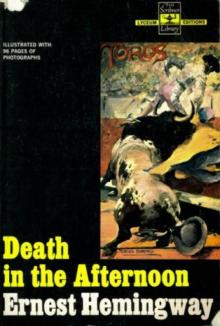 Death in the Afternoon
Death in the Afternoon In Our Time
In Our Time For Whom the Bell Tolls
For Whom the Bell Tolls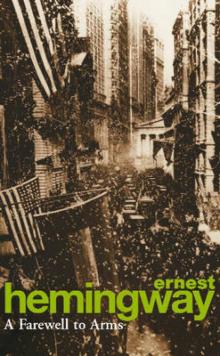 A Farewell to Arms
A Farewell to Arms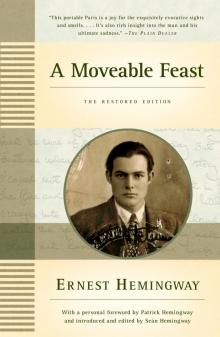 A Moveable Feast
A Moveable Feast The Complete Short Stories of Ernest Hemingway
The Complete Short Stories of Ernest Hemingway Big Two-Hearted River
Big Two-Hearted River Winner Take Nothing
Winner Take Nothing Islands in the Stream
Islands in the Stream To Have and Have Not
To Have and Have Not The Snows of Kilimanjaro and Other Stories
The Snows of Kilimanjaro and Other Stories Across the River and Into the Trees
Across the River and Into the Trees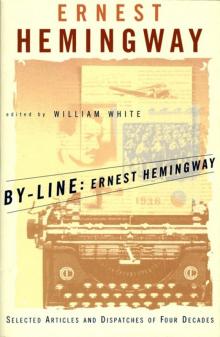 By-Line Ernest Hemingway
By-Line Ernest Hemingway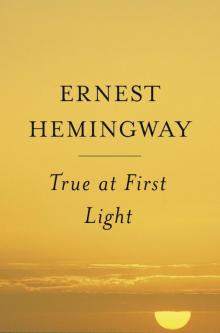 True at First Light
True at First Light Men Without Women
Men Without Women The Nick Adams Stories
The Nick Adams Stories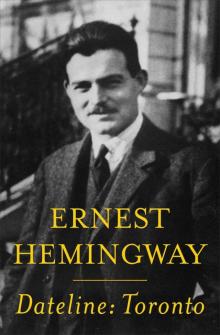 Dateline- Toronto
Dateline- Toronto The Torrents of Spring
The Torrents of Spring Short Stories
Short Stories